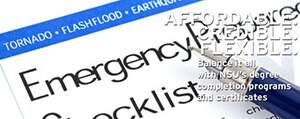Emergency Management FAQs
Frequently Asked Questions
What is the certificate called?
Students who complete the 24 credit hours in Emergency Management & Planning will
earn a Certificate of Emergency Management and Planning endorsed by the Oklahoma Department
of Emergency Management.
How much of the program is online and how long does each class last?
Courses are offered in face-to-face and online formats. We offer two courses per eight
weeks.
Where will the face-to-face classes be held?
The face-to-face instruction will take place either on the NSU Tahlequah or Broken
Arrow campus
How many credit hours are required for the certificate?
The certificate is 24 academic credit hourse. Each course is 3 credit hours
How long will it take to complete the certificate?
The program can be completed within one academic year or four, eight-week sessions.
Are the courses transferable college credits?
Yes, all courses are transferable as they will be offered by an HLC accredited state
institution. How they transfer (i.e., in what academic unit, or as what course) will
be up to the institution the student is transferring into. All hours are upper-level
3/4000 level courses. These will transfer as major credits if the student continues
on to earn a B.S. from NSU in Homeland Security. They will transfer as minor credits
if the student majors at NSU in a different program. If they transfer to another academic
institution, they will transfer as upper-level credit.
Are there entrance requirements?
There are no entrance requirements for students desiring to complete only the certificate.
There are special admission instructions that will be given to prospective students.
If a student intends to continue on and complete a degree, they are required to meet
the standard admission requirements of the university. These requirements may differ
depending on the previous academic experience of the student and will be evaluated
with the prospective student on a case-by-case basis.
Is financial aid available?
Financial aid is available only where the student is admitted to NSU through the regular
admission process. However, many employers will assist with tuition if the certificate
is part of professional development/education.
Who are the instructors?
The instructors are full-time NSU faculty members or adjunct faculty who undergo an
interview and screening process by our department. All adjunct faculty must possess
a master's degree or above, experience in their field, and pass a background check.
What will students who complete the certificate learn?
- Identify and evaluate risks and develop mitigation, preparation, response and recovery plans;
- Design training and exercise events that effectively coordinate public and private resources;
- Develop strong interpersonal, technology and social media skills to facilitate building mutual partnerships in emergency management;
- Develop collaborative vision and leadership in emergency management to administer successful intergovernmental, interagency and interdisciplinary programs;
- Make decisions, solve problems and use critical thinking skills within the emergency management process;
- Develop clear and effective oral and written communication skills.


